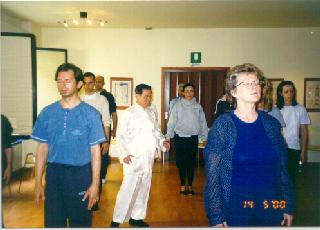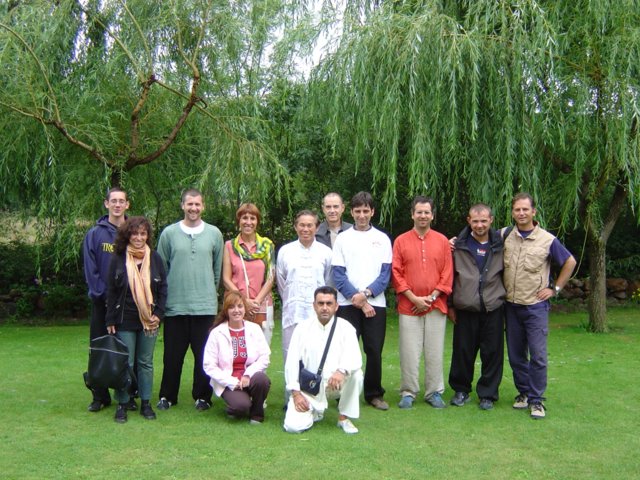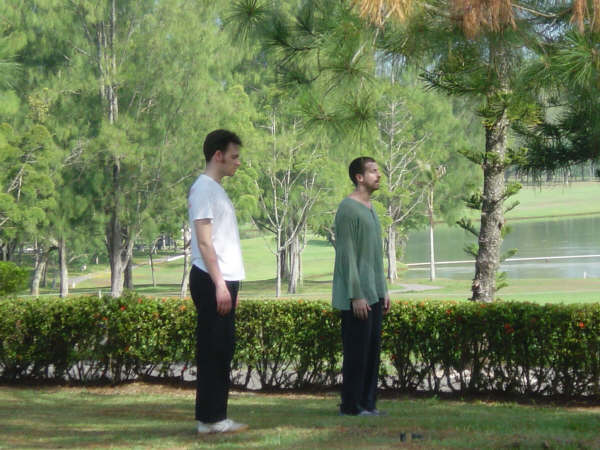December 2004 (Part 2)
SELECTION OF QUESTIONS AND ANSWERS

Chi Kung is a cultivation of jing, qi (chi) and shen, or essence, energy and spirit.
Question 1
I am very interested in the Intensive Chi Kung course. After one has completed the course will he be able to teach such techniques to others?
— Rodrigo, India
Answer
While you can attend very high levels in chi kung by practicing what you have learnt from me in my Intensive Chi Kung Course, the course is not meant to train you to become an instructor.
You are also strongly advised not to teach to others what you have learnt from my courses the way I teach you. Some people may think that I try to keep the teaching to myself. This is not so. The main reason is that you, and even the Shaolin Wahnam instructors I have trained, will not be able to teach competently the way I teach. Trying to teach the way I teach when you are not ready to do so, may result in serious, though insidious, harmful side effects.
Many people would not appreciate, or may not even understand, what I have just said. This is because they equate chi kung with gentle physical exercise. They think that once they know a chi kung technique they can teach it to others with similar results. They do not realize that in chi kung (and probably in any other arts), skills are more important than techniques.
A good analogy is surgery. After attending a lecture on surgical techniques, would you be competent to operate on a patient? Indeed, in many aspects successful chi kung teaching is more difficult than successful surgery. Surgery involves the physical, which can be seen, whereas chi kung involves energy and mind, which are not normally visible.
Many people think that in teaching chi kung the teacher merely teaches physical postures and movements. If this were the case, you could easily learn chi kung from books or videos. In my chi kung courses, amongst other skills, I teach students how to attain a one-pointed mind, tap energy from the cosmos, and generate an internal energy flow.
If even trained Shaolin Wahnam instructors cannot teach the way I teach, will our arts be lost? No, our arts will be preserved. Now the trained instructors may not be as skilful as I am, but in future they may be better. It took me more than 20 years to evolve my teaching methods, which now consist much of heart to heart transmission, but it takes me a much shorter time to pass on the methods to my instructors. Now, after just a year or two of teaching many Shaolin Wahnam instructors are producing results that in the past I would need 10 years of teaching experience to produce
Question 2
And, if not, what would it take to be able to do so?
Answer
In our school, before one can become an instructor he has to become a good student. One of our Shaolin Wahnam instructors, Jeffrey, sums up well what it takes to become a good student in three simple (but not necessarily easy) steps. Do what the master asks you to. Don't do what the master does not ask you to. Show proper respect to the master.
For example, if the master asks you to breath out gently but you blow out instead, or if he asks you not to worry about anything while performing an exercise but you start intellectualizing what type of chi is entering you and what it is doing inside your body, you are not a good student — you do not do what he asks you to, and you do what he does not ask you to. You also show him disrespect, implying that you are smarter than him.
After attaining a reasonably high standard in chi kung, as well as exhibiting high moral values, a good student may be invited to become a trainee-instructor. Usually he assists a trained instructor in teaching some classes. He also receives lessons and advice on teaching methodology from me. If he passes his probation, which may vary from a year to many years, he becomes a certified Shaolin Wahnam instructor.
Question 3
According to Chinese medicine, the body contains jing (essence, or internal energy), qi (intrinsic energy), and shen (spirit).
— Robert, USA
Answer
To be exact, the statement should read as follows. According to Chinese medicine every person is made up of jing, qi and shen. Jing is the physical body. Qi is the energy that keeps the body functioning. Shen is the spirit, soul, mind or consciousness. The body is alive because of qi and shen.
Western medicine would benefit tremendously from this Chinese wisdom. From the perspective of Chinese medicine, chronic, degenerative diseases like asthma, diabetes, heart failure and kidney problems are disorders of qi, whereas psychiatric diseases are disorders of shen. But qi and shen are not in the conceptual framework of Western medicine. Western medicine only treats the physical body. Hence, Western treatment for chronic, degenerative diseases and psychiatric diseases has not been satisfactory.

Some Shaolin Wahnam instructors with Sifu Wong in Sotillo, Spain in August 2004. Squatting, from Left: Trini and Jose Luis. Standing: Robin, Adalia, Jeffrey, Laura, Sifu Wong, Inaki, Javier, Jorge, Manolo and Riccardo.
Question 4
The amount of jing you have determines your lifespan, am I correct? Men lose jing through ejaculation, and consequently some of their life (I'm not sure about how women can lose jing). I was wondering if it is possible to increase your amount of jing. My research has said that it isn't possible, but Qigong can improve the quality of your jing. Could you comment on this?
Answer
One would better understand what is discussed here if he realizes that the Chinese concept “jing” when translated into English may refer to a few different, though related, meanings. When one says that the amount of jing one has determines his lifespan, “jing” means what in English would be translated as “DNA set-up”. One's jing or DNA not only determines how long his potential life is, but also other features of life like the colour of his skin and the scope of his intelligence.
When one says that men lose jing through ejaculation, jing here refers to sperms. While it is generally believed that habitually excessive sex would shorten a man's life, take comfort that views vary regarding the effect of moderate sex on life expectancy. Some believe that as sex gives a man joy (or, at least, pleasure), and as sperms are replaceable, it nourishes his spirit and therefore prolongs his life. Others are not as optimistic. They believe that the energy that gives life to sperms is drawn from “yuan qi” or “original energy”, which, like “yuan jing” or the DNA set-up, is fixed for life.
But even if you chose the second view, take comfort (or warning) that both yuan qi and yuan jing refer to potential lifespan, which is much longer than actual lifespan, and that denying oneself of wholesome sex which nourishes the spirit, like denying oneself of wholesome food which nourishes the body, would have adverse effect on actual lifespan.
Regarding your concern about how women could lose jing, you can be assured not to worry. As women produce eggs and not sperms for their sexual function, they have no worry about losing sperms. They also have no worry about their production of eggs regarding jing as DNA set-up because irrespective of whether they have sex, eggs will also be produced. On the other hand, having fulfilling sex will prolong women's life as it nourishes their spirit.
Yes, contrary to your research, it is possible to increase your amount of jing, if you take jing to mean sperms. Qigong is an excellent way to do so, improving both the quality as well as quantity of your sperms. If you take jing to mean DNA set-up, qigong cannot change it (e.g. it cannot change your skin colour or intelligence potential), but it can improve both the quality and application of your DNA set-up to such a remarkable extent that you are like a different person (e.g. changing your skin from pale to rosy, or changing you from a mediocre to a top scholar.)
Question 5
What should one's qigong training environment be like?
Answer
Open air with a lot of trees, preferably with a waterfall behind and a rippling stream in front.
Question 6
I have near-sightedness and I have read on your website that some of your students have corrected their near-sightedness. What Qigong did they do to fix their eyes?
Answer
Many of my students have corrected their near-sightedness. Most of them did not follow a special eye-improvement programme. They just practiced qigong exercises like “Lifting the Sky” and “Carrying the Moon” as other students did. A few used exercises from “Eight Eye Techniques”, like “Counting Leaves” and “Rolling Stars”. Please see October 2004 Part 2 issue of my Question-Answer series.

Marcus of England and Jeffrey of Australia, both Shaolin Wahnam instructors, experiencing cosmic awareness while in Standing Meditation during an intensive course in Malaysia.
Question 7
I read a lot of your books which are very fascinating. And I read that you can transfer chi to heal someone even from a far distance even though you don't know that person. Am I right? So I was wondering, could you heal my uncle's mother? I heard that she couldn't walk properly because it hurts her legs a lot, and she also has stroke sometimes. So can you please help her? I will be ever so grateful if you do.
— Yam, Malaysia
Answer
Yes, incredible it may be, it is true that I can transmit chi to heal someone over a great distance even if I don't personally know that person. I normally do this to save lives, when it is not feasible for me to attend to the person face to face. I do not transmit qi to any Tom, Dick and Harry just because someone asks me to do so.
Your uncle's mother has a serious health problem. If she really wants to get well (not just hopes to), she should consult not just a chi kung instructor, but a genuine chi kung master willing to help her overcome her problem. Or she could consult a good Chinese physician. Giving her this advice is an excellent way to help her. It is better than transmitting her chi.
Even if I transmitted chi to her (unless I do so everyday), it would not help her to walk properly without pain, nor overcome her strokes. But she could get these results if she practices high level chi kung from a master.
Question 8
While doing Abdominal Breathing, I find it quite hard to press on my abdomen gently for six seconds. If I do press on my abdomen, I would feel my arms tensed. Or maybe I've done something wrong. Please tell me what I should do.
Answer
Yes, your Abdominal Breathing is wrong, although you follow the instructions in my books exactly! This is a main reason why I emphasize that one should learn chi kung, especially advanced chi kung, personally from a master. Abdominal Breathing is advanced chi kung, though, surprisingly, some schools teach it as their beginning exercise!
Your Abdominal Breathing was wrong because you were tensed. The instruction is simple and direct: “Press on your abdomen gently for six seconds.” Although the instruction is simple, it may not be easy! Indeed many people find their arms tensed or their abdomen too hard to press.
What you should do is actually simple. If your arms are tensed while pressing, relax your arms. If your abdomen is hard, it does not matter. It is not mentioned in the instruction that you should make your abdomen soft, or you should press harder. Just follow the instruction, i.e. press on your abdomen (irrespective of whether it is hard or soft, whether it is flat or shaped like a big pot, whether you have just eaten a hamburger or drunk some milk into your stomach) gently for six seconds.
Yet, it may not be easy although the instruction is simple. That is why you should learn from a living instructor. If he is competent, he will get you to relax your arms.
Question 9
I learned meditation from a hierarch when I was having training in that temple. He told me to focus on my breathing, be aware of it and think of nothing. After 15 minutes of sitting in a lotus form, I began to feel pain. My knees were so painful untill I could not concentrate on my breathing. Meditation should bring inner peace and spiritual joy but I can hardly feel that kind of joy. So, I'm seeking for your advice to overcome my problem.
— Chin, Malaysia
Answer
Meditation can be practiced using various postures, which can be generalized into four categories, namely standing, sitting, lying down, and moving. Under each category there are numerous positions. For example, in the standing posture, one may stand upright with arms at the side or in a specific stance like the Three-Circle Stance.
In sitting posture, there are two sub-categories, namely sitting on a seat, and sitting in a lotus position. The lying down posture is usually used by those who are too old or too weak to attempt other postures. The moving posture is usually used in martial arts. When a master practices a Taijiquan set, he is in moving meditation.
Sitting in a lotus position, especially in double lotus, is the most advanced posture in meditation. But one should attempt the most advanced (in meditation as well as in other training) only when he is ready. Once I asked my sifu, Sifu Ho Fatt Nam, whether I could sit on a chair instead of in lotus position. He said I could, and could even attain remarkable results, including psychic powers, but if I wanted the best I should use the lotus position, at least the single lotus.
I told my sifu that my legs were too stiff to attempt the lotus position. He gave me a most logical answer — though at that time I could not see the answer but I was amazed to recall later. He told me to practice leg stretching exercises to loosen my legs. As I always aimed for excellence, I did that. It took me more than two years of daily leg stretching before I could be flexible enough to attempt the single lotus. Of course my effort was richly rewarded.
What the hierarch taught you was an advanced form of meditation. This method was taught by the Buddha to monks. You are not ready for this advanced method yet.
I would recommend that you use the standing posture. Stand upright and be totally relaxed. You should relax not just your body but also your emotions, your mind and your spirit. You can achieve this by loosening all your muscles, let go of all emotions, do not think of anything, and smile from your heart. Do not, for example, think of how to relax or whether you are relaxed. Just relax.
Then just be gently aware of your breathing. (Note the key word “gently”.) If you are breathing in slowly, just be aware that you are breathing in slowly. If you are breathing out through your mouth, just be aware that you are breathing out through your mouth. It is that simple — and very profound. If you follow my advice and practice daily for a few months, not only you will have no pain in your knees, you will also have inner peace and spiritual joy.
The hallmarks of our Shaolin Wahnam teaching are being simple, direct and effective. Try this method, which is called “Standing Zen” or “Wuji Stance”, for a few months and tell me whether it works.
LINKS
Selected Reading
- Taijiquan Technique against Muai Thai Round-House Kick
- To me it was Almost a Miracle — Dr. Hadi Sutedja
- Seeing Life in a Different Way and appreciating its Beauty — Luis Morgado and Anabela Sousa
- My Search is Finally Over — Neil Burden
- Experiencing Satori at the Blue Mountain — Laura Fernández Garrido
